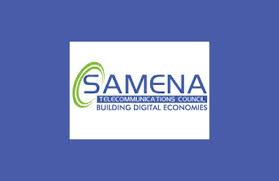 Kuwait City – Kuwait, April 08, 2013: SAMENA Telecommunications Council, the tri-regional non-profit telecommunications association for South Asia, the Middle East, and North Africa, has issued the findings of its region-wide ICT Policy Assessment and Digitization Study. The findings have been compiled into a full regional-level report as well as 10 country-level policy and digitization case studies, conducted specifically on UAE, Saudi Arabia, Qatar, Bahrain, Kuwait, Oman, Egypt, Jordan, Turkey, and Pakistan.
Kuwait City – Kuwait, April 08, 2013: SAMENA Telecommunications Council, the tri-regional non-profit telecommunications association for South Asia, the Middle East, and North Africa, has issued the findings of its region-wide ICT Policy Assessment and Digitization Study. The findings have been compiled into a full regional-level report as well as 10 country-level policy and digitization case studies, conducted specifically on UAE, Saudi Arabia, Qatar, Bahrain, Kuwait, Oman, Egypt, Jordan, Turkey, and Pakistan.
The ICT Policy Assessment and Digitization Study for Kuwait, as well as for other 9 diverse markets, assesses and evaluates the existence of digitization and enabling ICT policies, and quantifies how accelerated digitization can dramatically enhance the South – Middle East- North Africa region’s socio-economic development through facilitated adoption of digital services and applications. The Study has been conducted on major economic sectors within each of the aforementioned markets and establishes that, with enabling ICT policies and focus on digitization, the South Asia – Middle East – North Africa region can realize a US$1.3 trillion cumulative impact on its GDP by 2020, whereby more than 7.2 million new businesses and more than 13 million new jobs could be created. Among other things, the Study predicts that that the region can also achieve savings of US$12.9 billion through the adoption of smart grids over the next decade.
Mr. Bocar A. BA, CEO of SAMENA Telecommunications Council said, “Digitization is on the rise all around the world. However, in the SAMENA region, its pace needs to increase, because we are missing out on many opportunities. Even though this region has made significant progress in improving its digital infrastructure, much work is required on implementing effective ICT policies and ensuring that existing polices have the required digitization progress measurement and monitoring tools. As a part of the Study, we have proposed the ‘SMART SAMENA’ concept, which requires important requirements to be fulfilled by engaging multiple stakeholders.
Mr. BA added, “This Study is a unique knowledge tool that will assist the SAMENA Council and its membership in initiating and participating in global ICT policy imperatives. We now look forward to being engaged with regional policy-makers more effectively, and invite industry stakeholders to consider making the findings of the SAMENA Council’s Study an integral part of their knowledge base.”
The Study has revealed five major policy imperatives for realizing the “SMART SAMENA” concept. These include Sustainable, innovative, secure and vibrant ICT sector; Managed and risk mitigated digital transformation of economic sectors; Advanced ICT capital; Regional and local collaboration platforms; and Tracking and monitoring mechanisms.
In line with the objectives of the SAMENA Council’s Study, Dr. Hamadoun I. Touré, Secretary General of International Telecommunication Union (ITU), provided his expert assessment of the digital revolution that the telecommunications industry is currently experiencing. Dr. Touré commented, “In today’s dynamic regional telecommunications industry with the growing importance of digitization, shaping the digital future requires policy-makers and regulators to understand what their new role is and how to best execute it. To do so, they need the best possible market information and analysis. ITU is committed to helping the world reap the benefits of today’s digital environment and is privileged to contribute to the SAMENA Council’s Study.”
The SAMENA Council’s country-specific ICT policy and digitization case studies (“country packs”) are designed to provide an in-depth analysis of each market and how its major economic sectors, such as Healthcare, Government, Education, Energy & Utilities, Transportation & Logistics, and Financial Services, can benefit from ICT and telecommunications advancements, facilitated by futuristic ICT policies.
Key features of the ten case-study country packs include a global ICT rank analysis and evolution in global standing, existing level and impact of digitization across sectors in each country, potential for advancement and resulting impact of digitization on the overall economy of each country, level of investments required, high-level policy imperatives specific to each country for both ICT development as well as sectoral development, digitization policy assessment framework as well as justifications and considerations for measuring policy effectiveness and digitization, key KPIs, digitization opportunities in each of the economic sectors identified for each country, and stakeholder engagement matrices where applicable.
Further information on the Study has been provided on the SAMENA Council’s website at the following link: http://www.samenacouncil.org/digitization/
About SAMENA Telecommunications Council
SAMENA Telecommunications Council is a tri-regional, non-profit telecommunications association that represents over 40 telecommunications operators in 25 markets, representing an aggregate subscriber base of 790 million mobile users, including mobile broadband users, 79 million fixed-line users, and 22 million fixed broadband users. The Council’s membership embodies a community of telecom operators, manufacturers, government bodies, academia, and leading global management consultancy organizations. SAMENA Council’s Board of Directors and member companies include the largest regional operators and global multi-network operators as well as new competitive entrants. SAMENA Council focuses on digitization and broadband investment policies, and aims to promote beneficial regulation and governance that further industry evolution, as well as cooperation among key ICT industry stakeholders.
